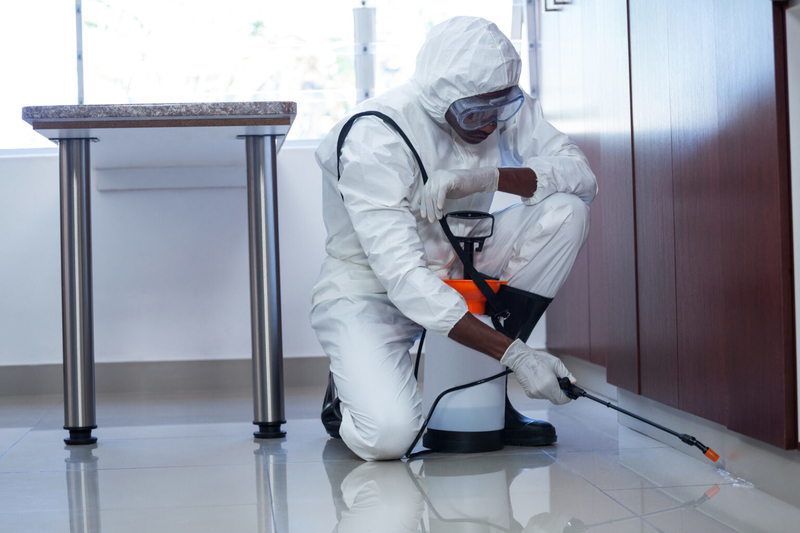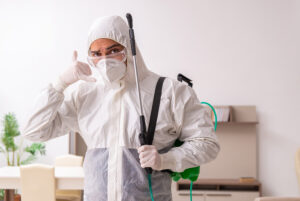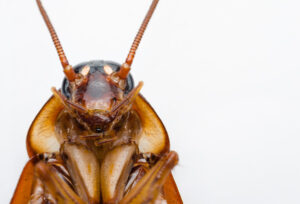Pests are problematic in a variety of different ways.
Not only is having pests scurrying around the house unsightly, but it can also be dangerous. Many pests spread bacteria and may also carry viruses and diseases. This makes them a huge health hazard. Other pests eat away at your home and do costly damage that can take a lot of time and money to repair.
If you notice pests in your home, contact Nationwide Pest Control. We can send out a pest control specialist to survey your property, identify the problem areas, and eliminate the pests. We will also take steps to make sure they don’t come back.
How Often Should You Spray for Bugs?
How often you should spray for bugs depends on a few factors (like the location and size of your home/building). With that said, you’ll generally want to have preventative pest control services performed quarterly or bi-monthly. During these treatments, your specialist will create barriers for pests and survey your property. If you’ve had an infestation in the past, they will check these problem areas to make sure the pests haven’t come back.
With all of that said, you’ll also need to have your property sprayed for bugs if you have a pest infestation. This should be done immediately. Don’t wait around and allow the infestation to get worse. Contact Nationwide Pest Control today. From there, you can set up ongoing pest control services to prevent any infestations in the future.
What is Nationwide’s Pest Control Process?
The Nationwide Pest Control process starts with a phone call or by filling out the estimate form on our website. From there, we’ll discuss the pest issues with you in further detail. We will then dispatch a pest control specialist to your home to survey the area and find where the pests are hiding. Once we’ve destroyed the nests on your property, we’ll create a barrier around your home to make sure the pests don’t come back. We also check out the perimeter of your property to make sure no pests are trying to make their way back in.
For more information about the Nationwide Pest Control process, contact us today. We’d be happy to answer any questions about our process and dispatch an expert pest control specialist to address your pest issue.
How Long Does the Pest Control Process Take?
How long the pest control process takes varies, as every property is unique. With that said, there are certain treatments that will take longer than others. For very basic pest control services, it may only take around a half-hour or so. For the removal of carpenter ants or termites, it can take significantly longer. The size of your property will also greatly determine how long it will take. If you have a small apartment, it will take a lot less time than a multi-room house.
Once you notice a pest infestation, reach out to Nationwide Pest Control. The sooner we are able to address the infestation, the less it will spread.
- Standard Treatment. Standard treatment is the simplest form of treatment and will generally take around a half an hour or so for a property that is 2,500 square feet or smaller. We’ll be in and out in no time.
- Active Infestation. If you have an active infestation, it will take our specialists a little longer to get to the root of the issue and eliminate the infestation. You can expect this process to take around an hour to an hour and a half.
- Termites. Termites are much more challenging to get rid of. Because they hide in the walls, the process is going to be much more intensive. Given that you’ve prepped your apartment (moved furniture away from the walls, clothes out of the closet, etc.), it may take upwards of eight hours to remove termites from your property.
Reach out to Nationwide Pest Control for more information.
Common Pests
Along with spraying quarterly or bi-monthly, there are some things you can do to lower the chances of a pest infestation significantly. Below are some of the most common pests, and what you can do to ensure they don’t make their way into your home…
Ants
Ants come in different varieties. In the United States, you’ll generally find Argentine, sugar, and fire ants. While they are all a nuisance, fire ants are particularly bad due to their painful bite.
To ensure ants don’t make their way into your home, consider these tips:
- Use weather-stripping on your doors and windows.
- Repair any damage that has occurred to the exterior of your house.
- Rinse out your cans and containers before tossing them out.
- Remove overgrown vegetation and tree branches from your property.
Rodents
If you’ve recently seen a furry critter scurry across your kitchen floor, you may have a rodent infestation. There are a few types of rodents that make their way indoors and cause mayhem—roof rats, Norway rats, and mice being the most common. Whatever type of rodent they are, they can damage your property, chew through wires, and eat your food. More than anything else, rodents are known for being spreaders of disease.
In order to avoid a rodent infestation, consider the following steps:
- Don’t leave food out. Put it in containers when you are done eating.
- Clean and vacuum your house regularly.
- Make sure you close your doors and windows.
- Don’t allow garbage to pile up in your house.
Spiders
Spiders are eight-legged critters that make their homes in the corners of your house. Some types of spiders are relatively harmless, while others can land you in the hospital with a single bite.
In order to avoid spiders spinning webs in your house, consider these tips:
- Close gaps that lead to the outside of your house.
- Remove rocks, debris, and branches from your property.
- Get rid of spider webs when you see them.
- Swap out torn or ripped window and door screens.
- Close your windows and doors when you aren’t using them.
Mosquitoes
Whether they are buzzing about annoying you or actively landing on you and biting you, mosquitoes are among the worst kinds of pests. Not only do their itchy bites annoy but they also have the potential of transmitting viruses and diseases.
If you don’t want to get bit by mosquitoes, consider taking the following steps:
- Cut your grass regularly and keep it short.
- Remove standing water from your house.
- Remove any stumps, brush, and debris from your yard.
- Fill in holes in your yard.
- Turn lids and containers outdoors upside down.
Termites/Carpenter Ants
Termites and carpenter ants are extremely destructive forces that can cause major damage to your property. They tend to grow in numbers and spread over time—all the while eating away at your property. Before you know it, you may end up with thousands of dollars in damages. If you find termites or carpenter ants in your walls, make sure you contact Nationwide Pest Control as soon as possible. The longer you wait, the worse the damage will get. Do not try to remove these pests on your own. It’s important to seek out the help of a pest control specialist to properly remove these destructive pests.
Cockroaches
Cockroaches are gross. We all know that. What some people don’t know is how efficient they are at spreading bacteria around your house. Cockroaches tend to get all over everything, and even in your food. Whether they are American, Oriental, or German, you’ll want to get rid of cockroaches as soon as you see them.
Here are a few tips to ensure cockroaches don’t make their way into your home:
- Use weather-stripping around your doors and windows.
- Check your packages for cockroaches before bringing them inside.
- Check the outside of your home for cockroaches.
- Ensure your basement stays dry.
Bed Bugs
Bed bugs are annoying critters that bite. While they often live in beds, they can also move to other areas of your home and cause problems.
Below are a few tips for avoiding bed bugs:
- Wash any clothes you purchase from the store as soon as you return home.
- Wash your sheets and clothing regularly.
- Clean your clothing when you return home from a vacation.
- Make sure to clean and vacuum your home often.
- Avoid purchasing used furniture when possible.
Wasps/Hornets
Wasps and hornets are mean, nasty insects that build nests outside of your house and on your property. While they resemble bees, they are a lot more aggressive and dangerous. It’s best to avoid trying to remove wasps and hornets on your own—especially if you have an allergy. Instead, contact a pest control specialist to ensure the wasps or hornets are safely removed.
Ready to Hire a Pest Control Specialist?
Whether you have a current infestation or you would like to prevent one in the future, contact Nationwide Pest Control. We’ll send out a pest control specialist to get rid of any critters in your home and on your property, then make sure they don’t come back.






